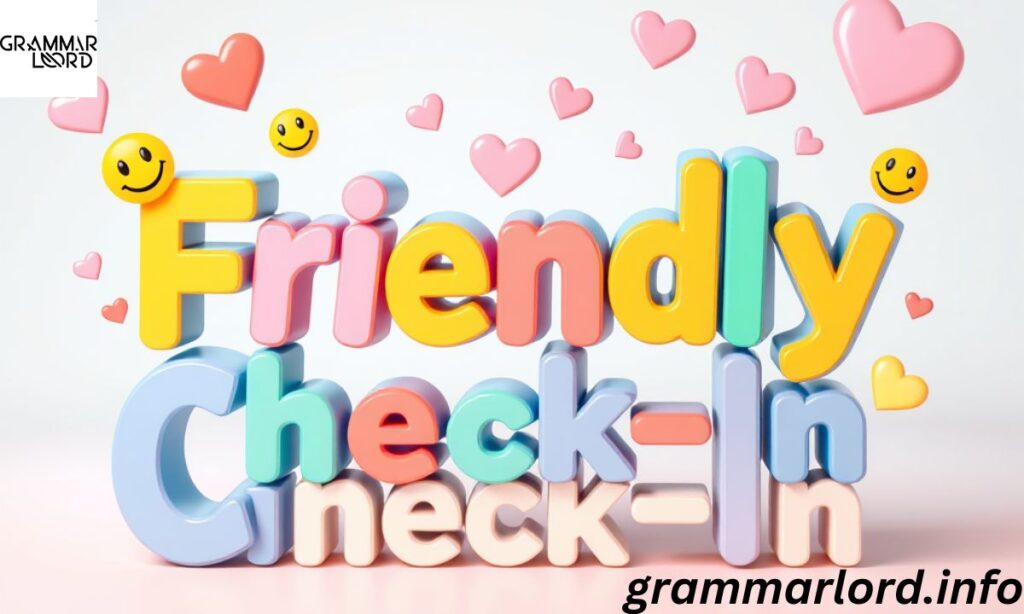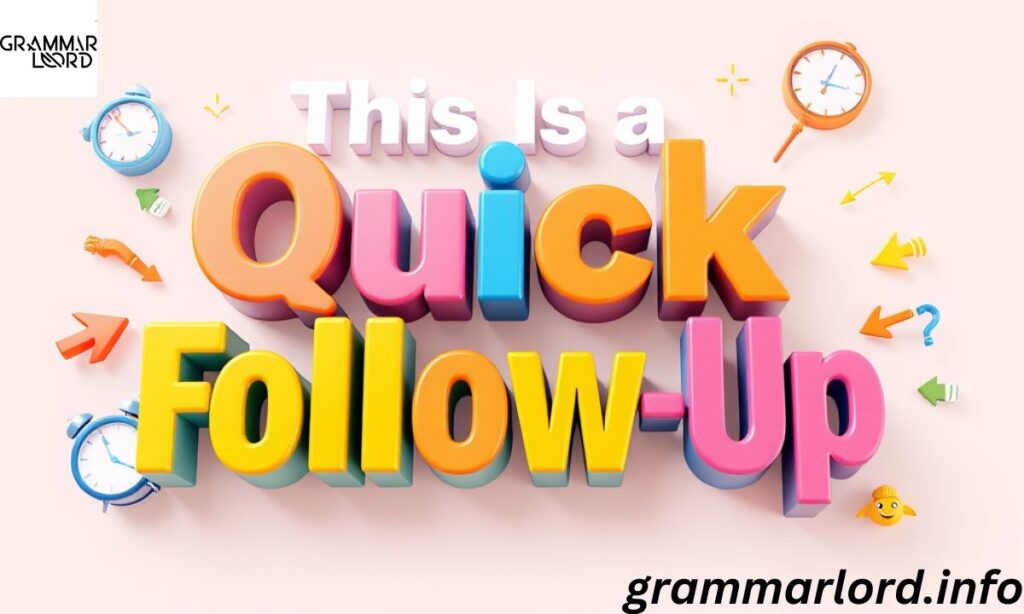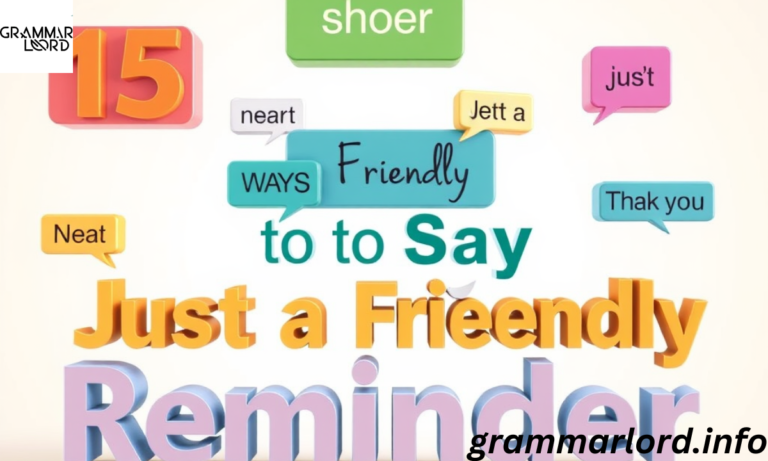Here are 13 different ways to say “Just a friendly reminder.” You can use these alternatives in emails, messages, or conversations to sound polite and professional. Some options include “A quick reminder,” “Gentle reminder,” and “A little nudge.”
Others, like “Don’t forget” or “Heads-up,” are more casual. If you want to be formal, try “Please be advised” or “This is a courteous reminder.” Choosing the right phrase depends on the situation and your audience. Using different expressions keeps your communication fresh and engaging.
Main Points
- Different ways to say “Just a friendly reminder” – Provides 13 alternative phrases.
- Variety in tone – Some phrases are casual, like “Heads-up,” while others are formal, like “Please be advised.”
- Situational usage – Choosing the right phrase depends on the audience and context.
- Professional and polite communication – Using alternatives helps keep messages polite and engaging.
- Avoiding repetition – Switching up phrases makes communication sound fresh.
A Quick Heads Up
Sometimes, people get busy and forget important details. Saying “A quick heads up” is a casual and polite way to remind them. It works well for informal emails, texts, or conversations. This phrase is friendly and doesn’t feel too pushy.
You can use it before sharing an important date, deadline, or update. It’s especially useful in workplaces or group projects. A simple “Hey, a quick heads up about tomorrow’s meeting” keeps things smooth. This way, you ensure everyone stays informed.
Just a Little Nudge
When you want to gently remind someone without sounding forceful, this phrase works well. “Just a little nudge” suggests a soft reminder without pressure. It’s ideal for reminding a coworker about a pending task or a friend about an event.
People often appreciate a subtle reminder rather than a direct demand. A simple “Just a little nudge about our lunch plans” keeps it light.
This approach maintains good relationships and avoids misunderstandings. Using polite language makes reminders feel more considerate.
Friendly Check-In

A “Friendly check-in” is great when you want to follow up on something. It sounds warm and thoughtful rather than demanding. This phrase works well in both professional and personal settings.
For example, you can say, “Just a friendly check-in to see if you need any help.” It shows you care while giving them space to respond. This is especially useful for project updates or checking on someone’s well-being. A friendly tone makes people more open to communication.
Gentle Reminder
Sometimes, reminders need to be polite and professional. “Gentle reminder” is a great choice for formal emails or work-related messages. It ensures you sound respectful while nudging someone to take action.
For example, you might write, “Just a gentle reminder that the report is due tomorrow.” This keeps the tone professional and avoids sounding harsh. It’s especially useful in workplaces where courtesy is important. Using soft language makes reminders more effective.
Thought I’d Mention
This phrase is useful when you want to bring something up casually. It works well when you don’t want to seem too serious or urgent. “Thought I’d mention” helps you introduce reminders naturally in conversations.
For example, “Thought I’d mention that the deadline is next week” sounds polite. It keeps the message light while making sure the person is aware. This approach works well for friendly reminders in any situation.
A Little Note
Sometimes, a simple note can serve as a great reminder. “A little note” is a kind and warm way to bring something to someone’s attention. It works well in written communication, like emails or sticky notes.
Saying “Just a little note about our meeting tomorrow” sounds friendly. It makes reminders feel personal and less like a demand. This phrase is great for informal and professional settings alike.
Just a Thought
When you want to offer a gentle reminder without sounding too direct, this phrase helps. “Just a thought” keeps things casual and open-ended. It’s great for suggesting something rather than demanding it.
For example, “Just a thought—maybe we should check in with the team before the deadline?” This way, the person doesn’t feel pressured but still considers the reminder. It’s a good way to keep communication smooth and positive.
Quick Reminder
If you need to remind someone briefly, this phrase is perfect. “Quick reminder” keeps things short and to the point. It’s useful for meetings, deadlines, or important tasks. For example, “Quick reminder that our call is at 3 PM today” gets the message across fast.
It works well in texts, emails, or verbal conversations. This phrase is polite but ensures the reminder is clear.
Keeping You in the Loop
This phrase is great when you want to update someone. It makes reminders feel like part of a friendly conversation. For example, “Just keeping you in the loop—our event starts at 5 PM.”
It’s useful in work and social settings. This phrase helps maintain open communication while providing necessary details. It ensures that people stay informed without feeling pressured.
Thought I’d Touch Base
This phrase is useful when following up on something. It sounds professional yet friendly. “Thought I’d touch base” is often used in business settings. For example, “Thought I’d touch base about the project deadline.”
It keeps the conversation open-ended while reminding the person. This phrase helps maintain smooth communication without being too pushy.
A Friendly Prompt
Sometimes, a little encouragement is needed. “A friendly prompt” is a warm way to remind someone without sounding demanding. It’s great for emails or messages where politeness is key.
For example, “Just a friendly prompt to complete your registration.” It keeps the reminder positive and professional. People appreciate reminders that don’t feel like orders.
Just a Little Reminder
This phrase is simple and effective for soft reminders. It’s polite and works well in various situations. Saying, “Just a little reminder that the payment is due soon” keeps things casual.
It’s great for emails, texts, or even notes. This phrase ensures that reminders feel light and non-intrusive. It makes people more receptive to them.
Don’t Forget!
This phrase is more direct but still friendly. It works well when reminding someone of something important. For example, “Don’t forget! The sale ends tomorrow.” It adds urgency without being rude.
This phrase is often used in marketing, event planning, or personal reminders. A little enthusiasm makes it even more effective.
Just Touching Base
Sometimes, a gentle check-in can make all the difference in keeping things on track. Whether it’s a project deadline, an upcoming event, or an unanswered email, reaching out ensures smooth communication.
This phrase is commonly used in professional and casual settings to reconnect without being too pushy. It conveys warmth and sincerity while reminding the recipient of an ongoing task.
A well-timed follow-up can prevent misunderstandings and keep everyone aligned. It also helps maintain relationships by showing attentiveness.
This Is a Quick Follow-Up

When you need to check on something without sounding intrusive, this phrase is a great choice. It lets the recipient know that you respect their time while ensuring that important matters aren’t overlooked.
Follow-ups are essential in both work and personal interactions to keep things progressing. This phrase works well in emails and messages when seeking an update. It maintains a professional yet friendly tone, avoiding any sense of urgency or demand.
A Friendly Heads-Up
Giving someone a heads-up is a thoughtful way to keep them informed about something relevant. It’s often used to share important updates, reminders, or potential changes in plans.
This phrase adds a casual, approachable touch while keeping the message professional. People appreciate a heads-up because it allows them to prepare accordingly.
Frequently Asked Questions
Which alternative is best for formal communication?
“Gentle reminder” or “Please be advised” works best for professional settings.
What’s a casual way to remind someone?
“A quick heads up” or “Just a little nudge” keeps it light and informal.
How can I remind someone without sounding pushy?
Use phrases like “Thought I’d mention” or “A friendly prompt.”
What’s a good reminder for business emails?
Quick reminder” or “Thought I’d touch base” sounds polite and professional.
How do I make reminders sound more engaging?
Vary your phrases and use friendly, conversational language.
Conclusion
Using different ways to say “Just a friendly reminder” keeps your communication fresh and effective. Whether you need a formal, polite, or casual tone, choosing the right phrase helps avoid sounding repetitive or pushy.
Simple adjustments in language make a big difference in how your message is received. By selecting the right words, you can remind people in a considerate and engaging way.

